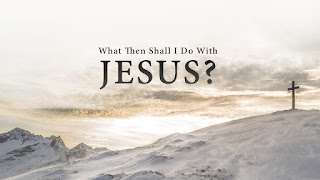Who do you turn to first?
"Then Jesus lifted up His eyes, and seeing a great multitude coming toward Him, He said to Philip, 'Where shall we buy bread, that these may eat?' But this He said to test him, for He Himself knew what He would do. Philip answered Him, 'Two hundred denarii worth of bread is not sufficient for them, that every one of them may have a little." -John 6:6-7
This is the well-known gospel account of Jesus feeding the 5,000 (could have been around 20,000 total, counting women and children). The story goes that the disciples find a boy with a lunch containing 5 loaves of bread and 2 fish, hardly enough to feed that many thousands of people. The miracle worked by Christ that day was the fourth "sign" displayed by Christ (of the "7 Signs" recorded in John's Gospel) proving His Deity (that Jesus was God; not just a good teacher or rabbi). It's interesting to note that of all the signs recorded in the 4 Gospel accounts, Matthew, Mark, Luke and John, the feeding of the 5,000 is the only sign recorded in all 4 (besides the resurrection of Christ).
The concern for this post is of a different nature though as I would like to briefly point to the above situation in John 6:6-7. Jesus posed a question to a disciple named Philip, and really the task was given to the other disciples. Jesus' question pointed to the impossibility of the situation however, Jesus already knew what He was going to do and how it could be done. As verse 6 says, He simply asked this question of Philip "to test him." It was an impossible task in human eyes as "200 denarii" would equal about 8 months' wages. The disciples, much less any average person, couldn't come up with that much money in such a short amount of time. It was impossible!
So why the test? What's that supposed to mean?
One glaring reality here is the immediate response of Philip to the situation. Did he turn to Christ first for provision and help? Did he initially put his faith in Christ to act? No....
Like all of us do, more times than not, Philip's initial reaction was to look to himself and to human means of providing a solution rather than the Lord. The test, in part, was "Who or who" the disciples would turn to in a time of need and provision.
Who you do you turn to first, reader?
This is the well-known gospel account of Jesus feeding the 5,000 (could have been around 20,000 total, counting women and children). The story goes that the disciples find a boy with a lunch containing 5 loaves of bread and 2 fish, hardly enough to feed that many thousands of people. The miracle worked by Christ that day was the fourth "sign" displayed by Christ (of the "7 Signs" recorded in John's Gospel) proving His Deity (that Jesus was God; not just a good teacher or rabbi). It's interesting to note that of all the signs recorded in the 4 Gospel accounts, Matthew, Mark, Luke and John, the feeding of the 5,000 is the only sign recorded in all 4 (besides the resurrection of Christ).
The concern for this post is of a different nature though as I would like to briefly point to the above situation in John 6:6-7. Jesus posed a question to a disciple named Philip, and really the task was given to the other disciples. Jesus' question pointed to the impossibility of the situation however, Jesus already knew what He was going to do and how it could be done. As verse 6 says, He simply asked this question of Philip "to test him." It was an impossible task in human eyes as "200 denarii" would equal about 8 months' wages. The disciples, much less any average person, couldn't come up with that much money in such a short amount of time. It was impossible!
So why the test? What's that supposed to mean?
One glaring reality here is the immediate response of Philip to the situation. Did he turn to Christ first for provision and help? Did he initially put his faith in Christ to act? No....
Like all of us do, more times than not, Philip's initial reaction was to look to himself and to human means of providing a solution rather than the Lord. The test, in part, was "Who or who" the disciples would turn to in a time of need and provision.
Who you do you turn to first, reader?


Comments
Post a Comment